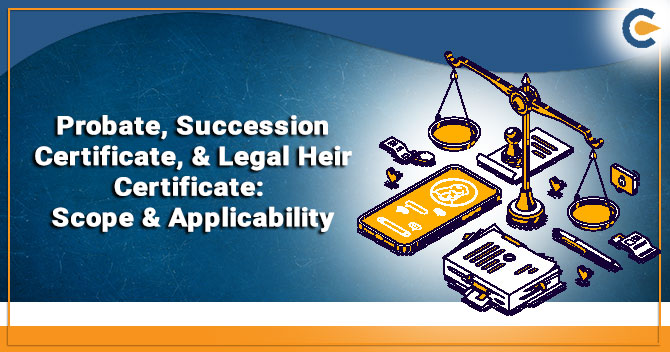Although a succession certificate, probate, & legal heir certificate are all diverted to one single goal of transferring the deceased’s property while giving effect to the desire of the same individual, they have distinctive property & repercussions.
Obtaining a legal heir certificate is predominately the initial step and is seemingly straightforward, whereas availing probate seeks a lengthy procedure that may not be compulsory in most scenarios. This article will talk about the scope & applicability of probate, legal heir certificate, and Succession certificate.
General Overview on the Probate, Legal Heir Certificate, and Succession Certificate
A legal heir certificate is granted to identify the beneficiaries of the testator, whereas a succession certificate is conferred to establish the legality & validity of the beneficiaries and impart them rights related to assets and securities of the testator.
A Probate is simply a legal process of authenticating the Will presented by the testator’s Executor. Remember, issuance of probate is not possible in the absence of the said individual.
Probate, Legal Heir Certificate, And Succession Certificate: How They Differ From Each Other?
The table below will let you draw a line of distinction between probate, legal heir certificate, and Succession certificate for the property’s inheritance.
| Basis | Will Probate | Succession Certificate | Legal heir Certificate |
| Why is it required? | The wills may be falsified, or one heir might challenge Will’s authenticity. In such an event, to ensure Will’s reliability & vesting rights such as disposal & distribution of the property in the Executor named included in Will or delegated by the Court, probate is needed. | A succession certificate is required for a movable property like such as shares, PFs, Bank deposits, loans, or other securities. It provides the debts’ collection on succession and ensures protection to the parties paying debts to the deceased’s representatives, as the successor accumulates the debt as a trustee. | Depend on the company and banks for payment’s transfer; a Legal Heir Certificate is often used to transfer patta for a property from deceased person’s name to their names, accumulate ex-gratia’s payment claims payment by gov. to the deceased person, etc. |
| Who can get it issued? | Administrator or Executor of a Will | Legal Heirs | Legal Heirs |
| Who has the rights to confer a certificate | Principal Court of Jurisdiction or before the High Court (as it has concurrent jurisdiction) | The District Judge located in the jurisdiction where the deceased usually lived at the time of his/her demise, or, if at the event had not a permanent place of residence, the District Judge, located in the jurisdiction where any part of the property of deceased falls, may confer a certificate. | Revenue Officer of the Taluq |
| Consequence | An Executor acting on behalf of the deceased to manage & distribute property among his/her heirs. | The individual to whom the certificate is conferred can get interested, or dividends on the property & may also transfer or negotiate the same. | A legal heir certificate is also used to claim amounts due to the deceased as it gives proof of relationship with the legal heir. |
| Effect of subsequent probate | A subsequent probate takes place of the grant of Succession Certificate. | – | – |
| Proof of representative title | Probate refers to legal proof of representative title | A succession certificate also act as a valid proof of representative title | Though Legal heir certificate can act as a prima facie proof, it is not a conclusive proof. |
| Ease of obtaining | A little bit difficult as compared to the Legal Heir certificate process as it seeks petition filing before a competent court in addition to a predetermined fee. | Slightly more tedious to avail in comparison to Legal Heir certificate as it seeks petition filing before a competent court in addition to a predetermined fee. | It is relatively easy to avail as it only seeks evidence of relationship to be proofed before the Revenue officer. |
| Documentation required | Fee (estimated on the assets’ value), Original Will, Death certificate, Title deeds related to the immovable property cited in the documents pertaining to the movables cited in the Will. | Court fee in addition to requested document such as the name of legal heirs and family members, detail pertaining to debts & securities for which the certificate is applied. Furthermore, a NOC from the family members may be asked for, or the honorable Court may demand a verbal verification of the same. Death certificate, Service certificate granted by the department in case of serving employee, Pensioner payment slip, Aadhar card, if any & family members names and relationship. | For the issuance of a Legal heir certificate, the following documents are required : Death certificate, Service certificate granted by the department in case of serving employee, Pensioner payment slip, Aadhar card, if any & family members names and relationship. |
From the facts included in the table above, we can conclude that the will probate, legal heir certificate, and Succession certificate are different legal instruments that cater to different needs. The short interpretation given below will let you grasp the core concept of these terms quickly.
- Probate is referred to as a legal process through which all Court authenticates a will as the testator’s last Will. It is a copy of Will validated by the eligible Court to the testator’s Executor. In the absence of the Executor, the Court would only grant the letter of administration in place of probate. Issuance of the probate by an invalid person under the Will cannot be made valid.
- On the other hand, the Succession certificate provides security to all individuals responsible for such securities or owing debts w.r.t all payments made to a person to whom a succession certificate conferred. The heir of the testator needs to approach a competent Court within whose jurisdiction the testator’s property is located and file a petition related to the succession certificate.
- And lastly, the legal heir certificate is a legal instrument for establishing a relationship between the testator & legal heirs to claim certain assets. This certificate may be used as an alternative to a succession certificate owing to its less intricate legal procedure.
In Aug 2020, the honorable Supreme Court declared that daughters would also rejoice equal coparcenary rights in HUF[1] (Hindu Undivided Family) properties if their DOB falls prior to the 2005 amendment of Hindu Succession Act, 1956- irrespective of whether their father coparcener expired prior to the amendment.
Conclusion
From the fact above, it can be easily interpreted that will probate, legal heir certificate and Succession certificate are the three distinct legal instruments that served a different purpose, even though they sound similar.
Read our article:Significance of Cease and Desist letter in a Legal Purview











